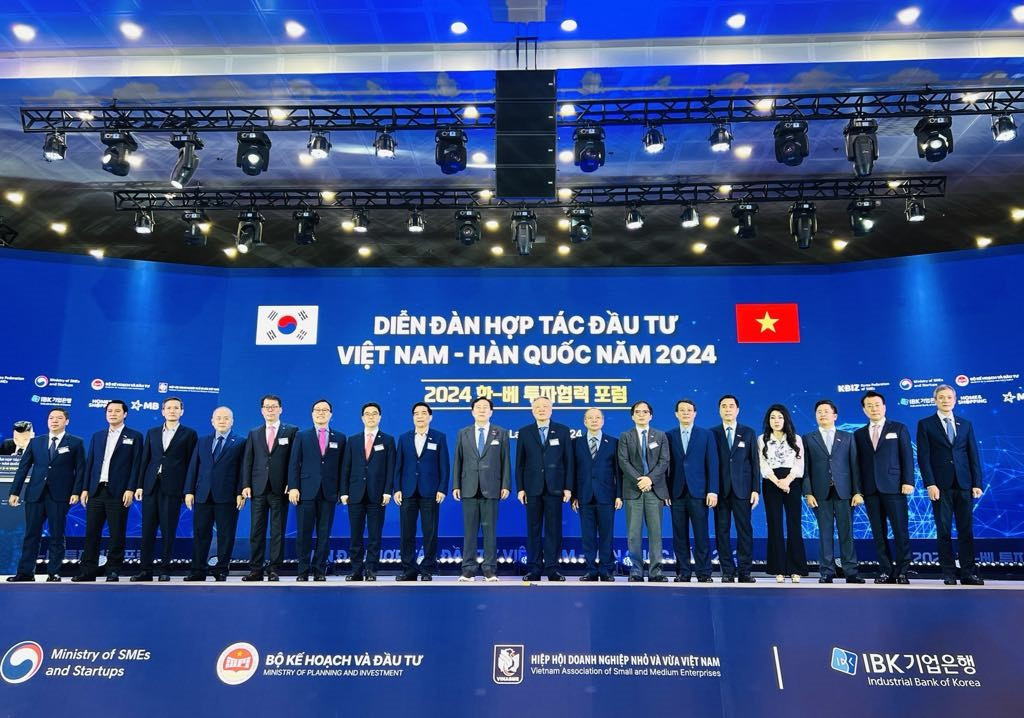The Vietnam-Korea Investment Cooperation Forum 2024, themed “Trust and Cooperation: Strategies for Sustainable Development of SMEs”, was held on November 21 in Hanoi. The event was co-organized by the Vietnam Association of Small and Medium Enterprises (SMEs) and the Korea Federation of SMEs.
Speaking at the forum, Deputy Prime Minister Nguyen Hoa Binh emphasized the remarkable growth in economic, trade, and investment cooperation between Vietnam and South Korea.
In 2023, bilateral trade turnover reached $76 billion, making South Korea Vietnam's third-largest trading partner (after China and the US) and its second-largest source of imports.
South Korea is Vietnam's largest foreign investor among 146 countries and territories, with nearly 10,000 projects and a total registered capital exceeding $87 billion. Key investment areas include high-tech industries, electronics, manufacturing, energy, automobiles, construction, and real estate.

“Leaders of the two countries have set a target to increase bilateral trade to $100 billion in the near future and $150 billion by 2030,” Deputy PM Nguyen Hoa Binh noted.
He also encouraged South Korean businesses to expand cooperation in areas where South Korea has strengths and Vietnam seeks investment, such as high-tech industries, electronics, semiconductors, artificial intelligence (AI), infrastructure development, renewable energy, biotechnology, and innovation.
Furthermore, he urged South Korean conglomerates to enable Vietnamese businesses to join their value chains, especially in sectors where Vietnam has potential. He also invited South Korean firms to consider Vietnam as a strategic destination for establishing R&D centers and applying advanced technologies.
To support these efforts, South Korean companies were asked to provide recommendations to the Vietnamese government to address challenges in production and business operations.
Kim Sung Seop, South Korea’s Deputy Minister of SMEs and Startups, highlighted Vietnam's importance due to its youthful population and strong digital adaptability. He noted that cooperation between SMEs from both countries could generate significant synergy.

He mentioned the K-Startup Center in Hanoi, which has been operational since 2023, as a platform for startups from both countries to collaborate, share technologies, and establish partnerships. Initiatives like these aim to address challenges faced by South Korean businesses investing in Vietnam.
Kim Sung Seop expressed optimism that the forum would deepen mutual understanding among private-sector companies, creating more investment opportunities and fostering bilateral cooperation.
Kim Ki Mun, Chairman of the Korea Federation of SMEs, highlighted successful Korean models like Samsung's smart factories and smart farms as valuable lessons for Vietnamese enterprises seeking to enhance productivity and adopt innovative technologies.
Nguyen Van Than, Chairman of the Vietnam Association of SMEs, emphasized the crucial role of SMEs in both nations:
In Vietnam, SMEs account for 97% of all businesses, contributing over 40% to GDP and employing 60% of the workforce annually.
In South Korea, SMEs make up 99% of enterprises, generating 46% of GDP and employing 81% of the workforce.
“Collaboration between SMEs in Vietnam and South Korea will create immense opportunities for both economies to thrive together,” he concluded.
Binh Minh